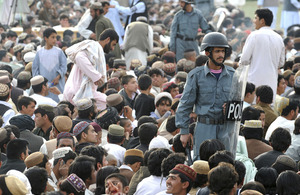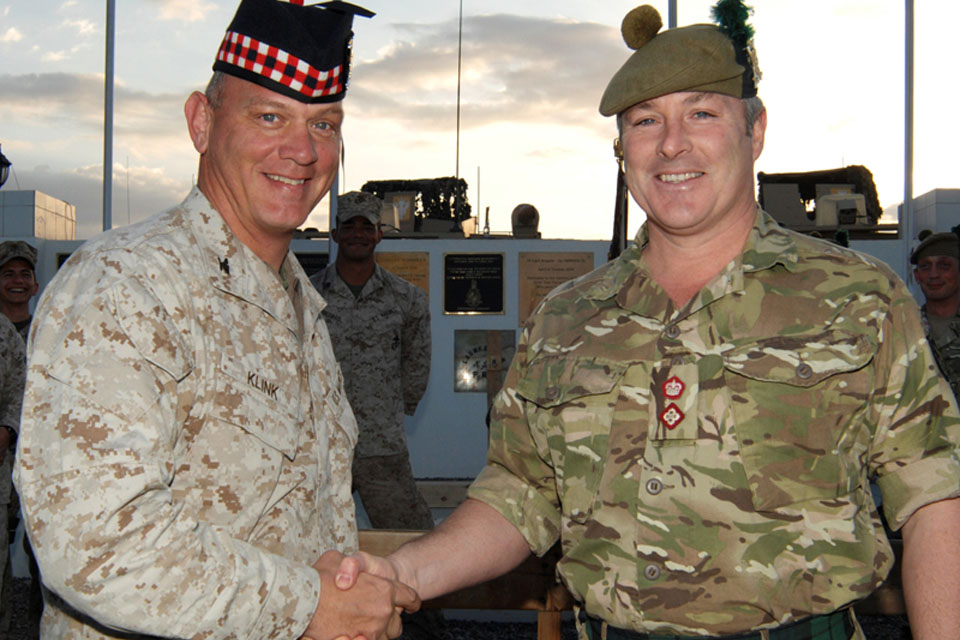UK and US troops work together to train Afghan Police
British soldiers and US Marines have been working closely for the past six months to improve the capability of the Afghan National Police (ANP).

Afghan National Police Officers patrol the crowds gathered for a concert to celebrate Nawruz, the Afghan New Year, at the Karzai stadium in Lashkar Gah [Picture: Sergeant Rupert Frere RLC, Crown Copyright/MOD 2011]
Teams from The Argyll and Sutherland Highlanders, 5th Battalion The Royal Regiment of Scotland (5 SCOTS), and the 1st Marine Division of the United States Marine Corps (USMC) have been jointly responsible for the training of the ANP in Afghanistan’s Helmand province.
Canterbury-based 5 SCOTS, which recruits predominantly from central and western Scotland, are now in the final weeks of a seven-month deployment to Helmand province, during which time they have fulfilled the role of Police Development Advisory Training Team (PDATT) within Task Force Helmand.
The US Marines from the 1st Marine Division have formed a unit known as the Provincial Police Advisory Team (PPAT) and have worked alongside the 5 SCOTS troops, making improvements in police recruiting, training and operations throughout Helmand. Both the Jocks and the Marines are based in Helmand’s provincial capital Lashkar Gah.

Colonel John Klink of the United States Marine Corps' Provincial Police Advisory Team with Lieutenant Colonel Adam Griffiths, Commanding Officer of 5 SCOTS [Picture: Corporal Pete George, Crown Copyright/MOD 2011]
While the 5 SCOTS PDATT has had responsibility for policing in the key central Helmand districts of Nad ‘Ali, Nahr-e Saraj and the city centre and outlying areas of Lashkar Gah, the US Marines have worked on improving the capabilities of the provincial police headquarters.
In light of this recent partnership, The Argyll and Sutherland Highlanders Regimental Museum researched the regimental archives to establish whether there was any record of them working together previously and discovered that the then 2nd Battalion Argyll and Sutherland Highlanders and the US 4th Marine Regiment served together in Shanghai in China from 1932 to 1933.
The Argylls were deployed to China as an emergency battalion to ‘protect the foreign area from internal disorder and to defend it against external aggression’, as their mission was given at the time. Shanghai was split into various defence sectors controlled by different countries.
One was held by US Marines, at the time the 4th Marine Regiment. The Argylls took over a sector close to the Marines and liaison officers were established within each headquarters. Just as the Argylls and the USMC worked successfully together in the 1930s, the modern-day partnership has seen great achievements in Helmand. Confidence amongst locals in the Afghan Police has evidently grown and the ability of the police to conduct operations unaided against the insurgency in Helmand has improved markedly.
The ANP are now taking on more and more responsibility for providing security, as well as normal day-to-day policing, in the populated areas of Helmand, from the US and UK troops based there.
A subtle yet critical development in the campaign against the insurgency has been increasingly to view IED emplacement and other acts of violence against UK, US and Afghan troops as criminal acts rather than acts of war.
Viewing them this way puts the emphasis on the Afghan Police to take primacy in the counter-insurgency effort. As such, crime scene exploitation, evidence-handling, and deeper understanding of powers of arrest and detention are now the focus of training the police and mentoring them on their day-to-day operations. Lieutenant Colonel Adam Griffiths, Commanding Officer of 5 SCOTS and the man responsible for leading the PDATT’s efforts throughout the deployment, commented on the work his battalion has done with the US Marines throughout the tour:
This has very much been a joint effort working closely to develop the capacity of the ANP and, in particular, the Afghan Uniformed Police,” he said.
We have seen demonstrable change over the past seven months and both the Jocks, in the form of the PDATT, and the Marines, as the PPAT, have worked hard to improve the accountability, sustainability and professionalism of the police here.
It has been a thoroughly enjoyable experience working with the US Marine Corps. Our antecedent regiments have history working together and it has been a joy to rekindle that relationship.
To acknowledge the work done together during this tour of Afghanistan, Lieutenant Colonel Griffiths presented each member of the USMC PPAT with a ‘Glengarry’, the traditional formal headdress of the Scottish infantry soldier worn on ceremonial occasions.
In turn, Colonel John Klink of the USMC PPAT presented the Argylls with their divisional insignia and a USMC badge of rank, representing each of the 5 SCOTS soldiers’ and officers’ own rank.
Commenting on the reasons behind the recent success of the ANP in Helmand, General Hakim Angar, Helmand Chief of Police said:
The foremost reasons are training and education. Now policemen better understand what is required of them and how to deliver it.
We have imposed strict discipline amongst our ranks and have rooted out practices which are contrary to the law. As I tell the people of Helmand, ‘the police and the people are one’.